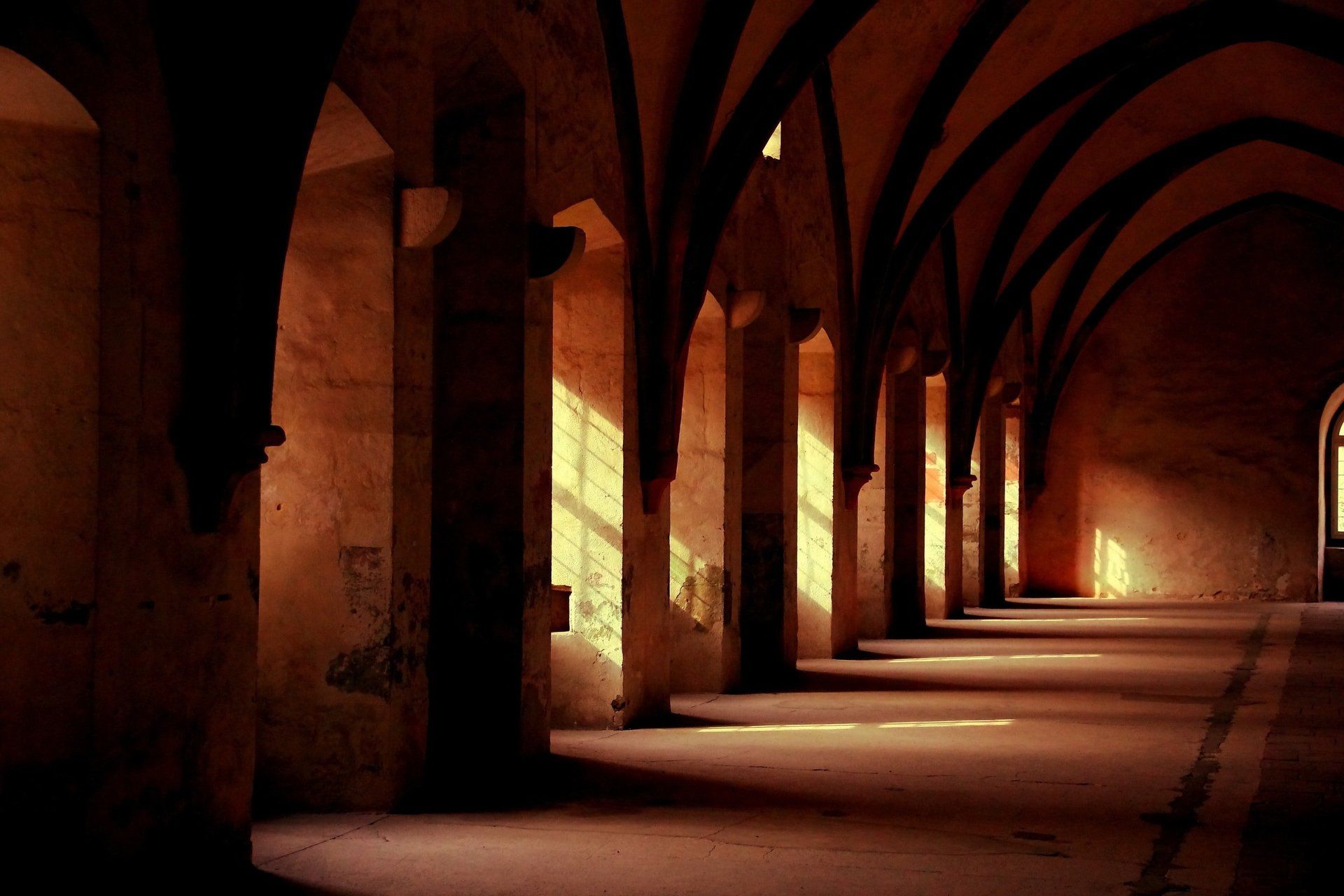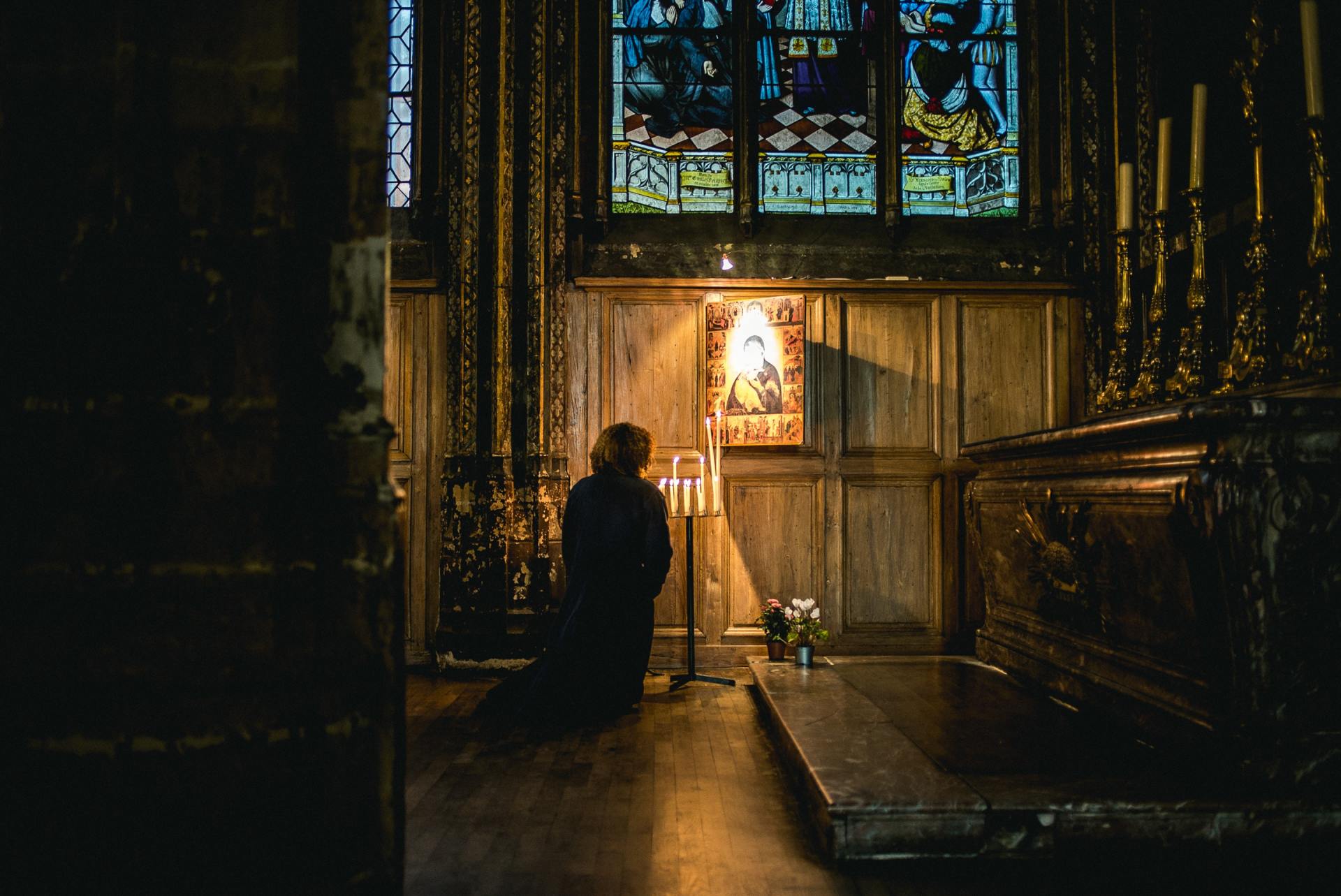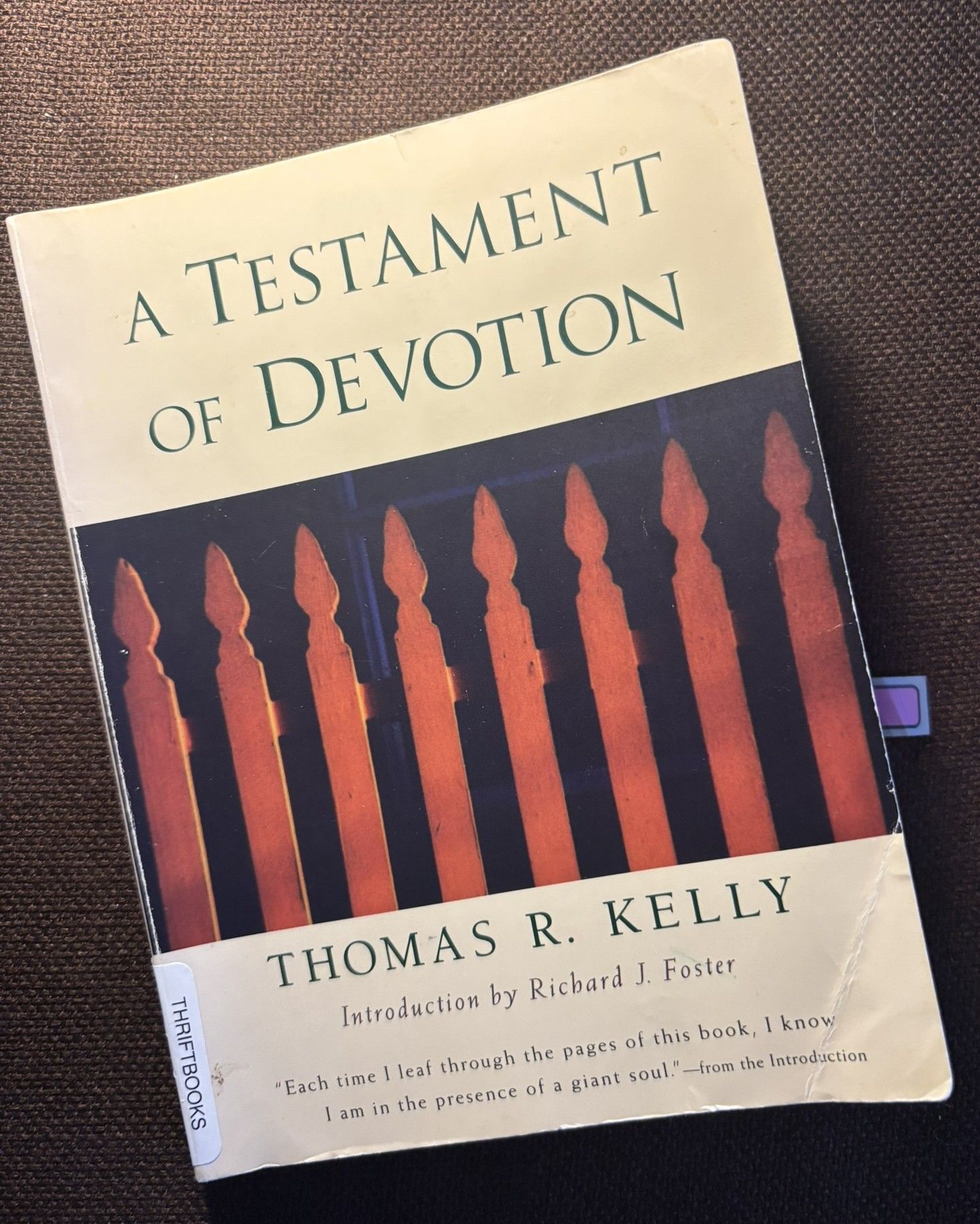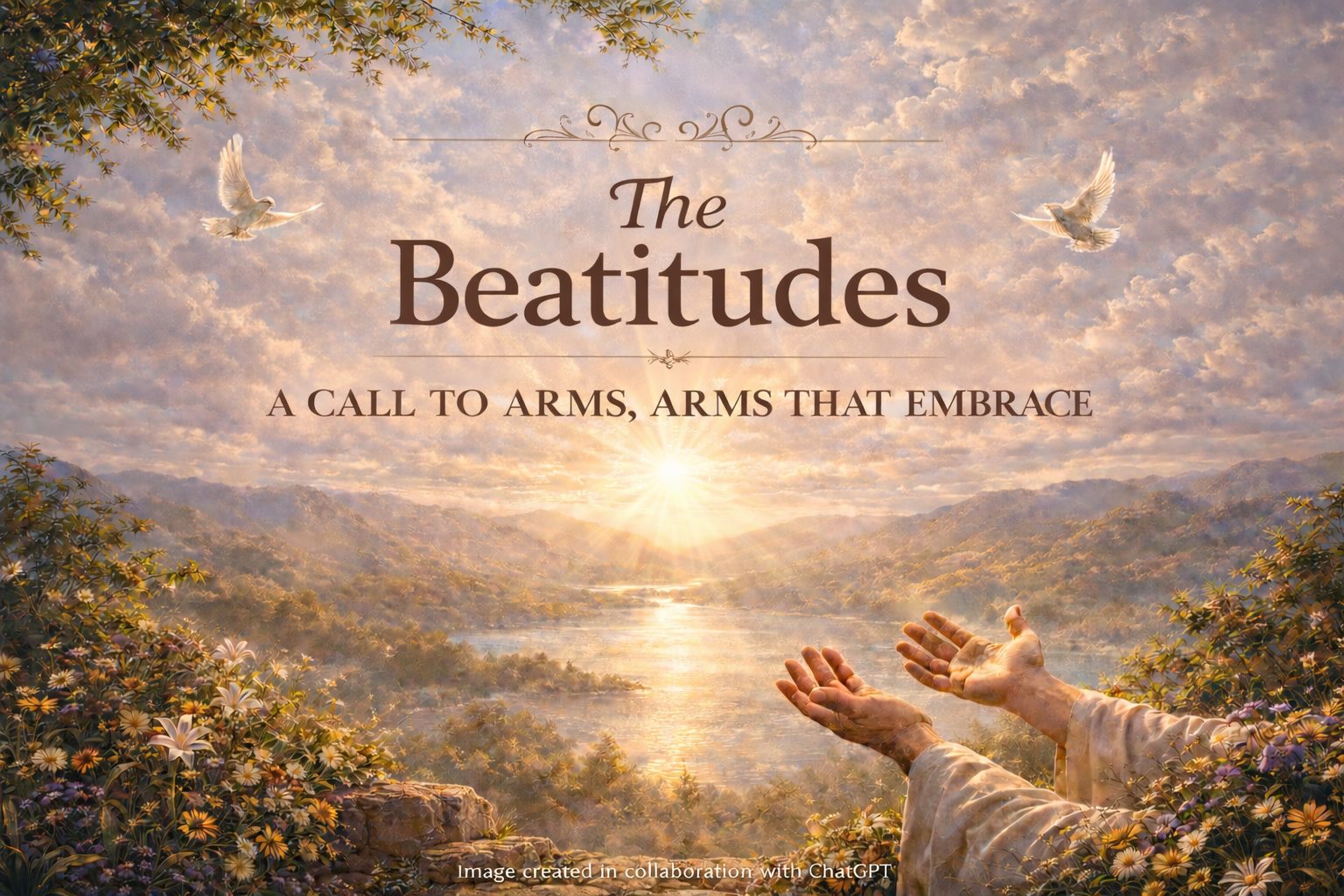My First Night In A Monastery
Pro Tip - Don't Plan On Keeping Up With Your Favorite Reality Show
By January of 2015 I was ready to spend some time in an actual monastery. I had developed an interest in the contemplative life and wanted to learn what it was like to be "cloistered". I realized, somewhere along the way, that I'd been living a cloistered - a secluded - life in many ways even though I didn't have the buildings surrounding me. I felt like I'd missed a bunch growing up and over the years and wanted to learn more. And still do (the mind, once opened, is very hard to close again....that's a paraphrase of someone).
I decided to stay at the Monastery of the Ascension, located in Jerome, Idaho just down the road from Boise. The experience, four days, was so meaningful. And a continuation of a love affair with Catholic contemplative practices (can I say that?). Here are notes I took over the first few hours I was there. The place was welcoming - I know they have had many, many people come on personal retreats, as I was, or in groups. Father Norbert, who has since passed, was my host and he helped me whenever I had a question.
I should add that this personal retreat came at the very start of a sabbatical. During this time, I was trying to discern where my research, and my life, focus might lead. I had been thinking a lot about the topics of irreverence and reverence before arriving.
I took notes while I was there and wrote them up later, which you see here below, but they are still pretty rough, as you'll see. They've been lightly edited for this "essay".
The story starts as I leave for Jerome.
January 13, 2015
To be accurate, my retreat is seven miles outside Jerome, Idaho. I am headed to the Monastery of the Ascension this morning, where I will spend Tuesday afternoon through Friday morning. I do not know what I will find there. Oh, I’ve found the physical Monastery before, having visited it earlier this year, but I don’t know what I will find about myself. Will I find my purpose in life? Will I see God? Will I have wonderful conversations with the prior or other monks? Will I write wonderful prose? Will I develop strong resolutions? Will I understand reverence more personally, contrasting it with, or conflating it with irreverence?
Will I spend most of the time napping? (Or napping camouflaged as meditation.)
All I know for sure is that the day starts dark and foggy here in Boise. I always pray my little car is up to the task of intermingling with semis over a long stretch of highway, under questionable conditions. But I love dark, foggy, reading/thinking/contemplating days. I’d rather them not to be on the road, in this case a two-hour drive, but I prefer to drive more than to sit behind a computer working.
Most of all, will I experience rather than theorize? Will I touch rather than cogitate? Induct rather than deduct?
The week stretches before me like a column of light up to God.
Today is the prophet Muhammad’s birthday. Another auspicious sign.
In fact, I leave in the afternoon rather than the morning, and take my time driving the two hours to the Monastery. To get into the mood I listen to interviews I’ve downloaded from Krista Tippett’s On Being podcast. On Being :
"… opens up the animating questions at the center of human life: What does it mean to be human, and how do we want to live? We explore these questions in their richness and complexity in 21st-century lives and endeavors. We pursue wisdom and moral imagination as much as knowledge; we esteem nuance and poetry as much as fact."
The first I try is an interview with Gordon Hempton. He is an “acoustic ecologist” and has collected sounds from around the world. The title of the interview is, “The Last Quiet Places: Silence and the Presence of Everything”. I’m headed to a monastery for four days and I think “duh!”. I start the interview and it’s interesting but for some reason it doesn’t connect with me today so I try Tippett’s interview with Jesuit priest James Martin. Martin, I find, has a sense of humor – he’s the Colbert Reports "chaplain" and is author of “Between Heaven and Mirth”. I settle in for their conversation and another 90 minutes on the road.
-------------------------
I write in a jumbled, inefficient way. I gather all the resources – books, articles, experiences – together I think might fit the bill and then I start reading and writing. Gradually – frustratingly gradually—I winnow all of that down to something I feel comfortable with sending off to a friend or colleague to read, and then ultimately to someone who might publish it. I go down many rabbit holes. Some of those bear fruit for the essay or chapter. Some are just interesting intellectual jaunts. I have written many pieces, mostly writing fragments on various topics, that never see an editorial review, but to me the goal is almost always to see my work published. It’s an inductive way of working though not entirely so and not so carefully pre-considered as one might hope or expect. Sometimes I might speculate a priori about concepts or processes and then try to understand those through research and writing, but “outline” is a foreign term to me, kind of like femme fatale. Both take you to places you think you want to go, but once you’ve inexorably followed the narrow path you wish you’d kept your options open.
------------------------------
In my shoulder bag I bring books, which I think will be helpful me as I think about reverence. While there, I bought another book from the bookstore/gift shop.
-------------------------------------
Books I Brought (or Bought)
Barrow, J. D. (2005). The infinite book: a short guide to the boundless, timeless, and endless (1st American ed.). New York: Pantheon Books.
Carrigan, H. L. (2001). Eternal wisdom from the desert: writings from the desert fathers . Brewster, Mass.: Paraclete Press.
Merton, T. (1969). Contemplative prayer . New York: Herder and Herder.
Hanh, T. N. (1991). Peace is every step: the path of mindfulness in everyday life . New York, N.Y.: Bantam Books.
Rohr, R. (2006). Contemplation in action . New York: Crossroad Pub.
Woodruff, P. (2001). Reverence: renewing a forgotten virtue . Oxford; New York: Oxford University Press.
-----------------------------------
I arrive about 4:20 p.m. The monastery sits by itself on the countryside, surrounded by a group of trees, and with fields then extending in all directions. Today, and for the duration of my stay, those fields and trees were covered with a shroud of snow, pristine white with breaches of black here and there across the countryside, holes in the carpet, as it were, for dark homes and tractors and cattle to poke through. It feels like Dr. Zhivago-Lara isolation (without the sexuality and with the knowledge that the Red Army wouldn’t be coming by to interrupt us, a pretty big difference I guess).
I was the only guest and am assigned room #12. There are sixteen guest rooms. Similar to an airport spoke and hub arrangement, two areas of eight rooms which encircle a common area are each connected to a hallway that leads back to the main building. I spend hours through my stay by myself in my common area without a soul to interrupt me, where a rocking chair and several comfortable, covered chairs are set up around a table. A high, vaulted ceiling is topped by glass, or perhaps plastic, that shed natural light into the room. I never turn on the lights to read during the day, and the dusky room allows me to alternatively meditate, read, and write without moving from my chair. After dark there is a night lamp and, other than the first evening, when I spent some time reading, I don’t turn on lights in the common area at all.
My room is simple and comfortable. Two twin beds, two chairs, tables for my gear, a bathroom with a shower that produced plenty of hot water. That is all I need or want. No TV – I didn’t see a TV or radio anywhere in the monastery—and I was glad. I set up my CPAP machine, for sleep apnea, dump my toothpaste and various travel items around the bedroom and bathroom, go looking in the main area for the shampoo and soap which I had forgotten to bring, and then I am ready.
Ready, that is, for Vespers, which are at 5:30 p.m. every day. I hustle over to the chapel, where several of the monks are already sitting, facing each other on each side of the altar. I walk in and Father Norbert, who has been my host in arranging this trip and also in welcoming me, gives me a three-ring binder opened to where we will be reading and a songbook, telling me the number of the song we would be using. They are used to guests here, Catholics and non-Catholics alike. I find a seat in the back of the room but, really, there is no place to hide. I’m the only visitor, and a non-Catholic at that, and the room is fairly small with, I’m guessing, 60 or so seats set up for people attending services. There is a lot of sitting and standing and bowing that goes on during these services, which coincides with readings. Usually one person – I never was sure if it was the prior or other assigned people—starts a reading or a song and then others join in either together or each side takes turns. Again, I’m not a Catholic, and as I focus on keeping up with the readings I find myself standing when everyone else is sitting, sitting when they are standing, missing a bow or coming bowing too late. It took me a couple days to be able to follow along easily though I ultimately had to ask what the rule was for sitting or standing.
“It used to be”, Father Norbert told me, “that we stood through the whole service, but since we are getting older, we now alternate”.
That made sense to me. Before Vespers start I hurriedly ask what the protocol is for me to take communion. I had forgotten, and I know that non-Catholics are not supposed to take the wafer or drink the wine, unlike my United Methodist church where all are welcome to do that though, unfortunately, we drink grape juice instead of il vino. Father Norbert tells me not to worry, he’ll tell me before the service of Eucharist the next morning. (It turns out we not-of-the-faith cross our arms across our chest and receive a blessing instead of holding out our hands for the host.) During the Lord’s Prayer I keep in my mind not to continue with “For thine is the Kingdom, and the power and the glory forever” as my Protestant habit would have me do.
I had decided before arriving that I would attend any of the services or activities that they would let me participate in, so I did, with the exception of Lauds each morning. At this monastery, perhaps all Benedictine monasteries, there is a daily routine. During the week, the schedule looks like this:
6:30 a.m. Lauds
7:00 a.m. Eucharist
8:00 a.m. Breakfast
12:00 a.m. Noon Prayer
12:10 p.m. Lunch
5:30 p.m. Vespers
5:55 p.m. Supper
8:00 p.m. Night Office
Saturdays and Sundays are a little different, but are basically the same routine.
Vespers, it sounds so “Name of the Rose” to me. So everything you read in novels about monks. When I hear it I think of my romantic notion of monastery life. Vespers are the traditional sunset service, and the Latin term for vesper means evening. It turns out to be pretty much a series of readings and a bit of singing. It’s my first hands-on introduction to monastic life and though I feel ignorant I enjoy the ritual. The monks continue through the service and I don’t make a blip in it, though I have to suspect that they are at least smiling to themselves at the rookie sitting in their midst.
After Vespers, we eat dinner. Guests go first and we each take a tray and go down a line to pick up our food. I then sit at a round table with Father Norbert and two other visitors, who are part of a construction job which will extending the building for additional library space. The rest of the monks eat by themselves in another room. It turns out the only meal the monks eat in the cafeteria with the rest of us is lunch. The meals are excellent, with a variety of food. I assume that each of the monks – there are only ten, it seems to me – has told the cook of particular likes and dislikes and that the likes end up on the menu fairly regularly. After all, these monks will be living together in this small community, this same location, and eating meals together for years, some for decades. After a while I imagine people know the preferences of each other pretty intimately.
After Vespers I pad back to my room and have time to settle in more seriously, then I head out to the common area, where I review my purpose for this adventure. My purpose is not to do research or to write about this experience. My goal, I wrote, for this retreat “is to seek reverence. Contemplative prayer. To seek God. It is not to report on the experience. Though I will be taking notes.” I of course am writing about the experience after all – no surprise - but my first goal is for deep contemplation and to try to be in the moment, away from the world.
I wrote in my journal the next morning. “If I wanted solitude and quiet I have gotten my wish. No one here except me. A Presbyterian minister arrives today. I am sitting in the high vaulted, with windows at the ceiling, common area. All alone. Only the sound of furnaces humming, pipes running. In one sense I don’t know what to do with myself. It feels like I should be hopping on the computer, checking my phone (just 2X/day), going to Starbucks. Activity. In another, I know what to do. Meditation. Prayer. Contemplation. Reading about reverence.”
I wrote to myself, “How can I be a better person?” My answer – “simple, grateful, joyful, serving-servant.”
That was my first night at a monastery. I have spent more time since then, and hope to do so on a regular basis for as long as I am able.
To receive all our Profound Living posts, please subscribe (it won’t cost you anything but time to read): https://www.profoundliving.live/
Please consider following the Profound Living Facebook page
And... please share this essay with others who might find it beneficial.
Finally, for something more wide-ranging, check out The Profound Bartender.













